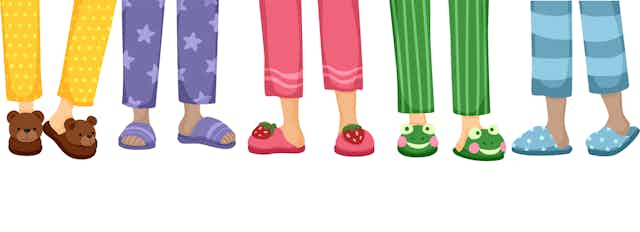Apparently, wearing pyjamas says something about your worth as a parent. The headteacher of an academy school has written to parents requesting that they ensure they wash in the morning and refrain from doing the school run in their pyjamas. She suggested that parents in pyjamas lower standards and fail to provide positive role models for children, reinforcing bad habits.
Reports suggest the move has received a high level of support from the local community in Darlington, north-east England. As a parent and educationalist, I couldn’t disagree with it more.
I think the debate is important because it’s about power. Those in positions of power have always sought to impose their value systems by manipulating people towards particular ways of behaving. To this end, philosopher Michel Foucault argued that one way of controlling people is to create a discourse that shames them into compliance. People in positions of authority hold particular power to induce such shame because they are perceived as experts by those over whom they hold that power.
Education is not immune to such issues of power and control. It has been argued that children, teachers, and schools are currently held accountable to an increasingly narrow idea of what constitutes a good education. The “parents in pyjamas” ban is a reminder of the ways in which power structures in education are expanding their control beyond the classroom and into family life: shaming, labelling and controlling parental behaviours that deviate from a dominant ideal.
Not bad role models
The underpinning implication is that parents who choose to wear pyjamas at the school gates are somehow bad examples, bad parents, or even bad people. Shame is the intended means of control here, based upon a belief that wearing your pyjamas at the school gates is morally questionable.

This should be of concern to all parents because it’s oppressive. Feminist philosopher Sandra Bartky argued that people are psychologically oppressed when they are persuaded (particularly by those who hold some sort of power over them) that something they do, or embody, makes them inferior human beings. What’s more, it’s even more oppressive if people are persuaded of their inferiority when the grounds for questioning it were deeply flawed in the first place.
There are numerous reasons why appearing in your pyjamas at the school gates doesn’t make you morally deficient. Parents who choose to delay their personal grooming routine until after they’ve done the school run in their pyjamas are not bad role models. It may be because they’ve opted to play with the kids, have a long family breakfast, or snuggle up with the children in bed for a bit longer when everybody’s sick of the endless daily grind and the kids are crying out for a cuddle. These parents are human beings trying to live in a way that feels right – for them and their families.
Learn to accept personal choice
Parental involvement in education clearly matters. Families and schools should work together to foster cooperative, supportive, mutual relationships. But that should never amount to a semi-dictatorial interaction, where parents are pressured by those in positions of power to passively enforce a narrow set of ideas about what constitutes a good education.
As educationalist Henry Giroux noted, a true democratic education should aim to help young people to become empowered, critically engaged, politically aware citizens. By such logic, a good parental role model is someone who possesses the critical awareness and personal integrity to challenge oppression and speak back to power when it feels right to do so.
In protest, I have written the best part of this article in my pyjamas. My seven-year-old saw me do it. But I’m not ashamed. Working in my pyjamas doesn’t reflect the fact that I have a bad attitude to work, or life, or that I’m an incompetent role model.
In fact, I feel rather comfortable, secure, safe, and relaxed in my pyjamas and I work very effectively that way. Rather than deciding for people what their pyjama-wearing habits mean about them, school leaders and parents alike ought to help children to appreciate and accept diversity and personal choice in others. Trying to understand when, where, and how people choose to wear their pyjamas is a great place to start.

